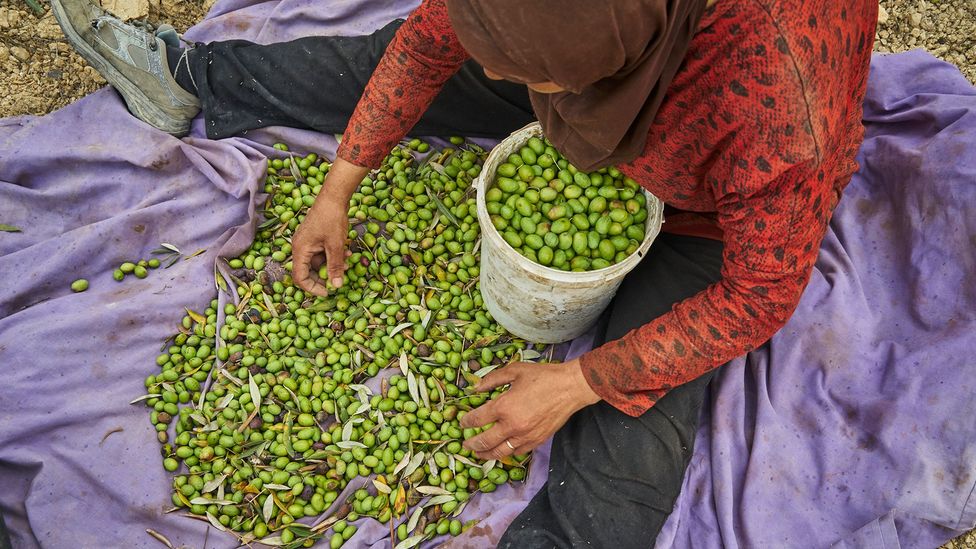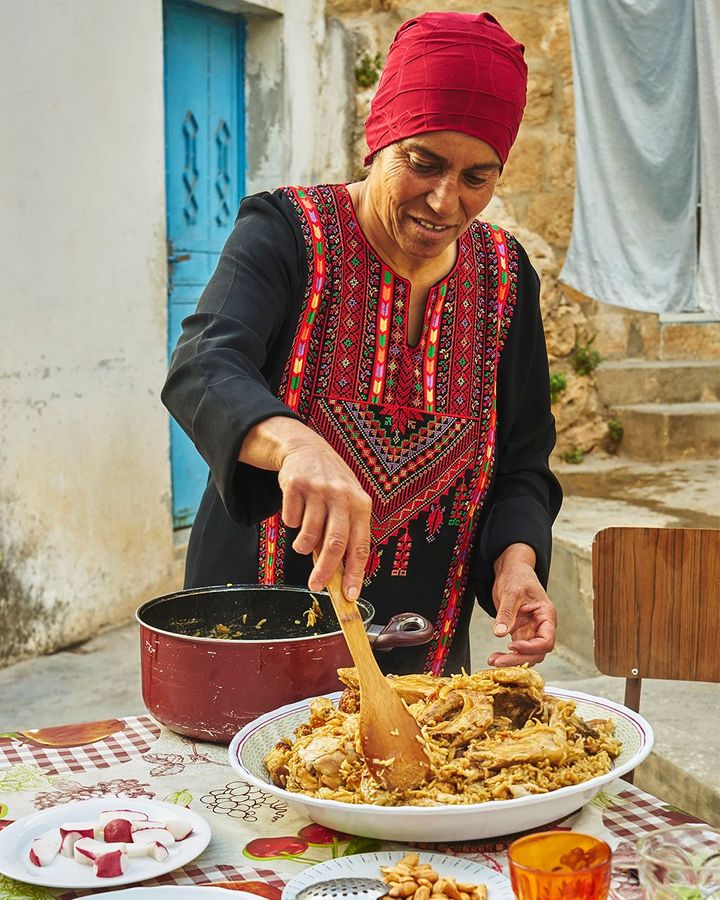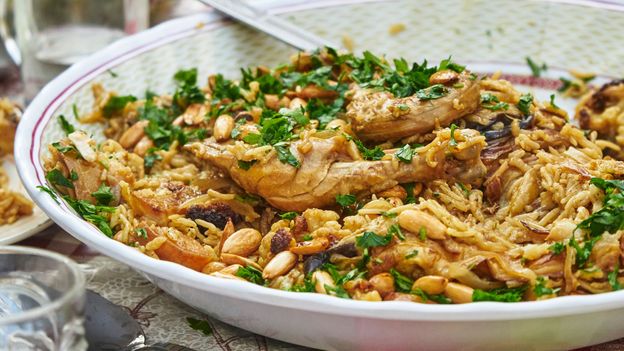Textured and creamy, this upside-down “cake” consists of chicken braised with aubergines, potatoes and cauliflower and is layered with rice. F
For many Palestinians, Eid al-Adha (the Feast of Sacrifice), held on 28 June this year, is celebrated with the most festive dish of all: maqloubeh (meaning “upside-down”). Ultimately, it’s a “cake” of chicken pieces braised with aubergines, potatoes and cauliflower, with alternating layers of rice – though some make it with lamb and other vegetables.
Its history spans several centuries throughout the Levant and is thought to originate in medieval Baghdad. Like the spelling of its name, there are numerous variations between families, religions and countries, but above all it’s considered a comforting dish to be shared among friends.
One delicious version of this convivial meal is regularly prepared by olive farmer Doha Asous, a diminutive, feisty woman based in the village of Burin in the northern West Bank, who passes her passion for and knowledge of organic agriculture onto fellow Palestinian farmers as well as those further afield.
Little by little, Asous’ star has been rising as she shares her insights into healthy eating, organic farming and heritage seeds. She has been invited on three occasions to Turin, Italy, by Slow Food to demonstrate Palestinian dishes and talk about farming. This past March, she travelled to London for Fairtrade Fortnight to broadcast the issues facing farmers in occupied West Bank. Wherever she goes, Asous captivates audiences with her zeal, candour and sense of sumud – a Palestinian trait meaning “resilience”.
Asous’ knowledge of farming comes from a lifetime of nurturing some 600 olive trees that produce fat green, purple and black fruit. After the October harvest each year, the best olives are packaged in recycled plastic soda bottles for sale as cured table olives, while the rest are sent off to the village press to be made into unctuous, deep-green virgin olive oil. Asous sells some of the oil or gives it to her brother’s family in Jordan, while keeping the rest. For her, “Olives mean life, and oil is the pillar of the house.”

For Asous, “Olives mean life, and oil is the pillar of the house.” (Credit: Jan Baldwin)
In Burin, where she lives with her schoolteacher husband and three adult children, Asous is also renowned locally for her peerless cooking. From her tiny kitchen, she creates gargantuan feasts that she serves in her courtyard, where friends and family gather to eat and enjoy time together.
Apart from the olive trees, essential ingredients come from her two-storey chicken coop, lemon trees and vegetable patch (for green peppers, potatoes, onions and lettuce), while Asous also makes her own za’atar (an aromatic seasoning mix) from home-grown sesame and thyme. For her, pomegranates are another treasure. She exclaimed, “Keep the perfect unsplit ones for a year and you have brilliant crimson seeds!” For any other needs, one of her children drives her 10km to the town of Nablus, where street stalls and a souk offer a cornucopia of grains, vegetables, fruits, spices and utensils.
When it comes to the celebratory dish of maqloubeh, Asous clears as much kitchen space as she can for its preparation. She wants it to be perfect, as this is the dish that her family pines for: textured, creamy chicken, vegetables and rice enhanced with the flavours of bay, rosemary, cardamom and black pepper.
The magic comes when it is served at the table; with a flourish Asous flips the saucepan onto a platter, then gently shakes the pan to loosen and empty out the contents. Thus, the upside-down dish stands at centre stage before slowly collapsing – and the family dives in.

For the celebratory dish of maqloubeh, Asous clears as much kitchen space as she can (Credit: Jan Baldwin)
Doha’s Maqloubeh recipe
By Doha Asous
Serves 6
Accompany with a side salad of finely chopped tomato, radish, onion, cucumber and parsley, dressed with lemon juice and olive oil.
Ingredients
6 plump chicken legs
2 onions (one quartered, one thinly sliced)
3 cardamom pods
2 bay leaves
2 large sprigs of rosemary
sea salt
1 head cauliflower, broken into large florets
sunflower oil
6 medium potatoes, thickly sliced
3 medium aubergines, peeled in stripes, then sliced crossways
olive oil
150g toasted almonds
500g (17.6oz) long grain rice, rinsed (see Note)
500g (17.6oz) short grain rice, rinsed (see Note)
4 tsp mixed spice (such as ginger, allspice, coriander, nutmeg, mace)
fresh ground black pepper
a generous fistful of flat-leaf parsley, chopped
Method
Step 1
In a large pot, simmer the chicken legs in water over medium heat with the quartered onion, cardamom, bay leaves, rosemary and a large pinch of salt until cooked, about 30 minutes. Spoon out the chicken and reserve about 1 ½ litres of broth; discard the onion and herbs.
Step 2
In a pot of boiling water, parboil the cauliflower florets until just tender, about 10 minutes. Drain and reserve.
Step 3
In a large frying pan, add 4 tbsp of sunflower oil. Fry the potato slices over medium heat till golden, about 15 minutes. Transfer to a plate and reserve the frying oil.
Step 4
Meanwhile, in a large bowl, toss the aubergine slices with salt and leave for 20 minutes to remove excess moisture. Rinse and pat dry. Reheat the reserved oil and fry the aubergine over medium to high heat for 10 minutes, until golden. Transfer to a large plate.
Step 5
Add the cauliflower florets to the oil and fry for 20 minutes until brown. Transfer to the plate.
Step 6
Wipe out the pan and add a bit of olive oil. Add the almonds and toast until golden and fragrant; transfer to a plate. Add the sliced onion and cook until golden. Set aside.
Step 7
Lightly salt the chicken pieces and place them in a deep pan over a handful of the rinsed rices; scatter with the fried onion and half the mixed spice. Now layer successively the aubergines, cauliflower and potatoes, each time interspersed with a handful of the soaked rice.
Step 8
Finish with a layer of rice, season with the rest of the mixed spice and pepper, then pour over the reserved broth to about 3cm over the top. Cover with a lid, then simmer over medium-high heat for 30 minutes without stirring. Reduce heat to low halfway through.
Step 9
When the rice is cooked and the liquid absorbed, remove from the hob and let cool for 5 minutes. Carefully place a large plate over the open pan and invert the maqloubeh onto the plate. Sprinkle with chopped parsley and toasted almonds and serve.
Note
The rice must be thoroughly rinsed until the water is clear before cooking. Doha likes mixing the two types of rice, though other maqloubeh cooks don’t.
BBC.com’s World’s Table “smashes the kitchen ceiling” by changing the way the world thinks about food, through the past, present and future.
—
Join more than three million BBC Travel fans by liking us on Facebook , or follow us on Twitter and Instagram .
If you liked this story, sign up for the weekly bbc.com features newsletter called “The Essential List”. A handpicked selection of stories from BBC Future, Culture, Worklife and Travel, delivered to your inbox every Friday.

